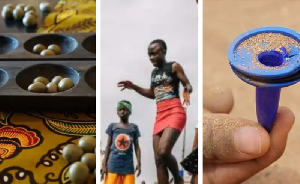A GhanaWeb feature by Joseph Henry Mensah
I’m sure that after reading the headline, you’re reminiscing about the games you played as a child.
These are the games that had you leaving home every weekend to join your friends and returning only when you were thirsty or hungry.
The games that made you rush home after school to be with your friends.
Yes, I’m talking about our Ghanaian folk games like Pilolo, Oware, Toli, Aanto W'akyire, Sansankroma, Bambamamlika, and many others.
Before technology became dominant in Ghanaian homes, these nostalgic games fostered unity among families and communities.
They even helped groom leaders, as participants took on leadership roles in these games. However, with the rise of technology, many of these games are losing their relevance.
Today’s kids are glued to ‘borrowed’ foreign games like FIFA, Candy Crush, Grand Theft Auto, Swing, and others.
With that being said, let’s cast our minds back at these games and how they were played
Pilolo
Pilolo is an ‘energetic’ traditional game that involves running around, paying attention to detail, and record-keeping.
The objective is simple: one participant hides sticks that serve as treasure while the others either close their eyes or leave the scene.
The hider then shouts "pi-lo-lo," signaling the others to search for the hidden items.
A finishing point is indicated where participants must run, touch it, and return to the hider with the sticks. The winner is recorded based on the highest number of sticks found.
Sansankroma (roaming hawk)
"Sansankroma," derived from the Akan language meaning "roaming hawk," is an outdoor game typically played at night after storytelling by a bonfire. It can be played by both genders.
In this game, participants squat in a circle while passing a rock to each other quickly, singing the "sansankroma" song.
If a participant fails to pass the rock and accumulates two or more in front of them, they are exited from the game.
Aanto w'akyire
Aanto W'akyire is an Akan folklore game that requires participants to stay alert. They sit in a circle while a moderator runs behind them with an object, singing a folklore song "aanto w'akyire" while clapping.
The moderator secretly drops the object behind one of the participants. If the participant notices it, they pick it up and chase the moderator.
If they fail to see it, the moderator lightly taps them until they pick it up and run to become the new moderator.
The game continues until all participants decide to stop.
Bambamamlika
"Bambamamlika" is a Ghanaian folk game played by both genders. Participants stand in a circle with a moderator inside.
The moderator runs around the circle, pointing at each participant as they sing the "Bambamamlika" song.
When the song ends, the participants in front of the moderator must dance with them. That participant then becomes the new moderator, and the process continues until the game ends.
Oware
Oware, also known as Mancala, is a popular board game in Ghana. It’s a strategic game played with seeds or stones on a board with shallow pits.
The objective is to capture your opponent’s seeds by strategically moving them around the board.
Originally, Oware was played on the ground with twelve holes dug into the earth (two rows with six holes each). Today, it’s often made from wood and is portable for easy transport.
Toli
"Toli" is a Ghanaian folk game centered around storytelling, usually enjoyed around a fireside.
The storyteller must be humorous, exaggerating, and creative, ending the tale with a moral lesson.
Most of these stories are usually carved.
How can we preserve these indigenous games?
Parents should play these games with their children on weekends or holidays to help preserve this dying culture. This fosters unity and communication within families.
The Ghana Education Service (GES) should incorporate these games into the curriculum, allowing students to play them during recreational time.
Communities can also designate specific days for Ghanaian indigenous games, promoting unity and preserving our cultural heritage.
Entertainment of Friday, 11 October 2024
Source: www.ghanaweb.com













